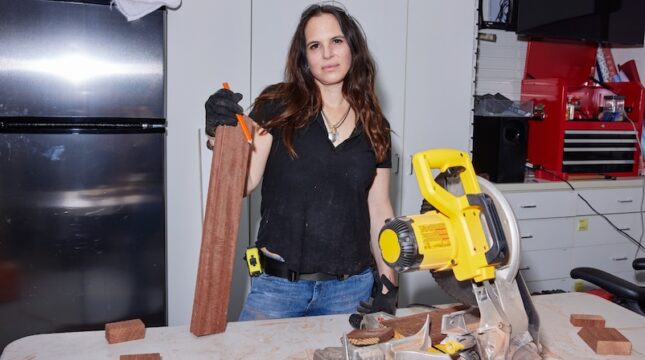The Department of Business and Professional Regulation (DBPR) also has some examples of construction activities that do/do not need a license.
How to get a handyman license in Florida
Since no Florida handyman license application exists — as there isn’t a license for this type of work — you must apply for a general contractor license or a residential contractor license issued by the DBPR. There are two types of contractor licenses available in Florida state:
- Certified license. This type of state license allows you to work anywhere in Florida.
- Registered license. This type of license only permits you to work in certain local jurisdictions in Florida.
In most states, you must submit an application before taking a licensing exam. But in Florida, you’ll need to pass an exam or obtain a certificate of competency first.
To get a certified license, sign up for the exam through Professional Testing, Inc. This test includes three parts:
- Business and finance
- Contract administration
- Project management
If you are pursuing a registered license, you will need a certificate of competency from a local licensing authority.
Once you pass the test or get your certificate of competency, you may submit your application to the DBPR. With your application, you must include the following:
- Application fee (pricing varies depending on the type of license and whether you apply in an odd or even year)
- Electronic fingerprints for a background check
- Employment history
- FICO credit report (If your FICO credit score is below 660, you must take a 14-hour financial responsibility course.)
- Proof of satisfaction of liens, judgments and discharge of bankruptcy (if applicable)
- Supporting legal documentation (if applicable)
Applicants must be at least 18 years old, have a passing score on all parts of the license examination and demonstrate financial responsibility.
They must also meet the education/experience requirements. You need at least four years of work experience, a four-year construction-related degree or a combination of work experience and college-level credits.
Local Florida handyman business license requirements
While there is no state-level handyperson license, there may be requirements in local municipalities.
Jacksonville
All businesses operating in Jacksonville or Duval County must obtain a City Business Tax Receipt from the municipality. Businesses operating from a fixed location, including home-based businesses, are required to get a Certificate of Use from the Zoning Department.
No additional insurance mandates exist beyond Florida’s state-level requirements for licensed contractors. However, some project types or homeowner associations might have specific insurance requirements, so you should clarify beforehand.
Miami
All businesses operating within the Miami city limits must obtain a Business Tax Receipt annually. If your business is located within a municipality, you will need a Business Tax Receipt from both the county and the municipality.
If you operate as a mobile handyperson without a fixed location in Miami, you might need a Transient Vendor Permit, depending on the scope and frequency of your services.
Miami doesn’t impose any mandatory city-level insurance requirements beyond the state level.
Tampa
While state-level contractor licensing applies, certain specialties within handyperson services might require additional Tampa Occupational Licenses. For example, electrical or plumbing work often requires specific city permits and licenses.
As for insurance requirements in Tampa, there are no city-specific mandates.
Orlando
Orlando doesn’t have any additional city-specific license requirements for handymen beyond state-level regulations. A handyperson business in Orlando would require a business license and possibly a contractor certification, Employer Identification Number (EIN) and a seller’s permit.
Additionally, the City of Orlando mandates obtaining a Certificate of Use along with a Business Tax Receipt.
No additional insurance mandates are in place at the city level.
What kind of insurance does a handyman need in Florida?
Regardless of whether your work requires a license, handyman insurance can help protect your business. This may include the following types of Florida business insurance coverage:
Workers’ Compensation insurance
Handyman services with employees must have workers’ compensation insurance in Florida, which can help cover medical expenses, lost wages and employer liability if there is an on-the-job injury, illness or death.
General Liability insurance
Your clients may ask for proof of Florida general liability insurance, which can help provide coverage if someone other than an employee gets hurt or you accidentally damage property that doesn’t belong to you.
Tools and Equipment insurance
Tools and equipment insurance can help provide coverage for your gear in the event of damage or theft.
Commercial Auto insurance
If you drive for work, commercial auto insurance can help cover costs related to accidents, such as medical expenses and property damage.
To drive in Florida, you must have minimum coverage for your vehicle insurance:
- $10,000 in PIP insurance, or personal injury protection.
- $10,000 in liability insurance for property damage.
Commercial Property insurance
Commercial property insurance can help cover damage or vandalism to your equipment and inventory and commercial buildings you own or rent for your business.
What is the certificate of insurance requirement if you’re a licensed contractor?
You must show proof of insurance that you have the following coverage as a licensed contractor:
- General liability: $300,000
- Property damage: $50,000
- Workers’ compensation: Dependent on the number of employees you have
If you do not have any employees, you can apply for a workers’ compensation insurance coverage waiver.
How NEXT supports Florida handypeople
NEXT Insurance helps you get the right handyperson insurance to protect your small business and help you thrive in a competitive industry.
Business owners can use our convenient online services to apply for coverage and get a certificate of insurance in just minutes. You’ll also have access to unlimited COIs to print or share electronically at no extra charge, and you can log in to your account from any computer or mobile device whenever you need to make changes or updates to your coverage.
Get an instant quote online today.
Do you plan to work as a handyman in another U.S. state? Find out what states require handyman licenses in our summary of handyman license requirements.
This information has been provided as a service. It is correct and up-to-date to the best of our knowledge; however, it is in no way intended to offer legal advice and you must always consult with local authorities before you make any business decisions. Regulations and requirements may change at any time.







